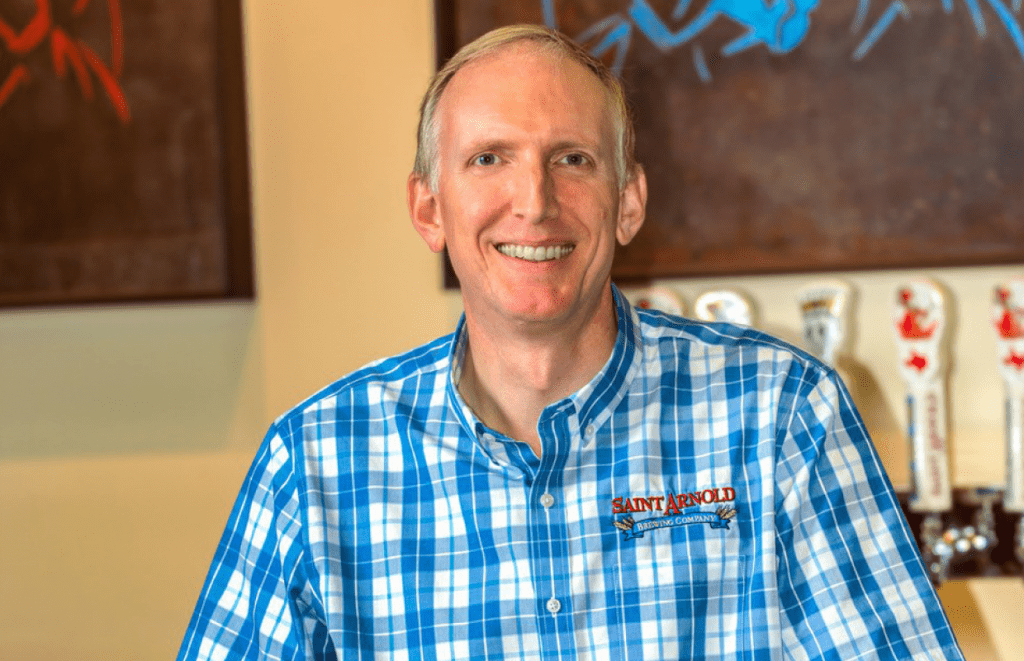Brock Wagner, Founder/Brewer of Saint Arnold Brewing Company
 Brock Wagner has a long history with beer. In fact, it starts before he was born. His great-great-great grandfather came from Alsace in the mid-1800’s and opened Wagner’s Beer Hall in San Francisco (now the oldest existing bar in the city, renamed The Saloon.)
Brock Wagner has a long history with beer. In fact, it starts before he was born. His great-great-great grandfather came from Alsace in the mid-1800’s and opened Wagner’s Beer Hall in San Francisco (now the oldest existing bar in the city, renamed The Saloon.)
Wagner grew up in Cincinnati and Brussels, both big brewing towns, where he was exposed to many of the beer styles of the world. Then in college at Rice University, fate (and a friend) introduced him to home-brewing. This love of beer and brewing was what eventually led him to the inevitable: opening a microbrewery. Wagner graduated from Rice University in 1987 with a BA in Economics.
I understand that Saint Arnold is the oldest craft brewery in Texas and that you originally chose to locate in Houston because it was the largest city in the US without a microbrewery. Being the first to succeed at something is usually a tough thing to do. Why did you think that craft brewing would succeed in Texas and what made you think that Houston was the right place to start it?
 Craft brewing was taking off in most of the country in the early 1990’s but hadn’t yet so far in Houston. I love Houston and with its size I figured that being the first microbrewery would be a pretty certain path for success. I had no idea how challenging it would be to create a market for craft beer in Houston.
Craft brewing was taking off in most of the country in the early 1990’s but hadn’t yet so far in Houston. I love Houston and with its size I figured that being the first microbrewery would be a pretty certain path for success. I had no idea how challenging it would be to create a market for craft beer in Houston.
How important is the water you use for your beer and what is the source of the water for your brewery?
Water being about 95% of the ingredients in beer makes it incredibly important. Within certain parameters, most municipal water works well especially since breweries typically treat their water. Water can have an effect on the types of beers you can brew well. When I opened Saint Arnold, the water we received from the City of Houston was primarily sourced from wells. As subsidence has become a larger issue for the city, almost all of the water supply is now sourced from surface water. The switch-over for us occurred around 2001.
What type of treatment does your water undergo before it is ready for the brewing process, and how important do you think the quality of your water is to the ultimate quality of your beer?
Our water is run through a reverse osmosis system to purify it. We then add back the minerals that we desire for each beer recipe, primarily some combination of calcium chloride and calcium sulphate. We also add a small amount of city water that has only been run through a charcoal filter to add some trace minerals.
As Saint Arnold’s beers continue to become more popular, do you have any concerns about obtaining enough water to meet your future needs?
Supply of water should be a concern for every brewer. Houston is pretty well situated for water but nothing should be taken for granted. I know of breweries in more arid regions that have either had to truck in water or have made emergency plans to have water trucked to them.
Is it true that Saint Arnold’s beers are only available in Texas and Louisiana? If so, how did you decide on at that geographic focus?
We distribute our beers only in Texas and Louisiana. Brewing has traditionally been a local business and we like it that way. Beer is best when fresh and we can control our inventory well with a limited distribution footprint.
Now that you have mastered the art brewing beer, what is next for Saint Arnold?
We began making cider at the beginning of this year. We may have other top secret plans in the works.



